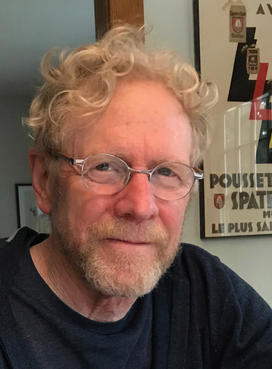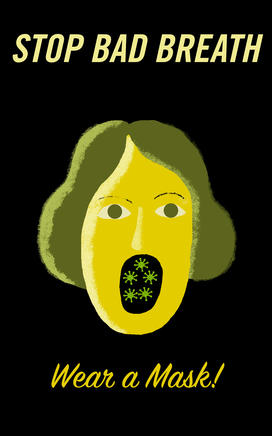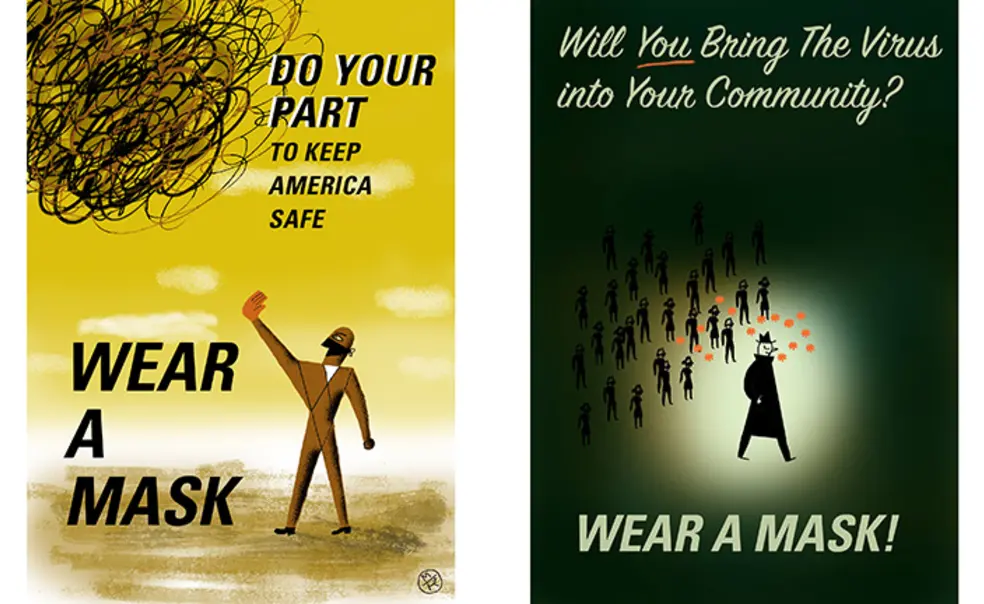Marc Rosenthal ’71 Created Public Propaganda Posters for COVID-19
‘What seemed to me really lacking is that idea of everyone pulling together to defeat this thing as if it was a war’

“What seemed to me really lacking is that idea of everyone pulling together to defeat this thing as if it was a war. That’s what led me to look at the posters of WWII,” he explains.
A longtime illustrator, Rosenthal decided to use his artistic expertise to help fight the pandemic. Using humor, patriotism, and a bit of shaming, he created World War II-style posters encouraging Americans to wear a mask for the sake of their neighbors. “Do Your Part to Keep America Safe,” proclaims one. “Will You Bring the Virus into Your Community?” asks another.
“The masks seem just like the obvious point, the pressure point — the easiest thing to do that would make a huge difference. I was hoping to get a message out there to counter the idea that it’s about personal liberty, that’s it’s a personal choice not to wear a mask. It is really about responsibility,” he says.
Rosenthal leaves room for a bit of humor with his “Stop Bad Breath” poster, which employs a common advertising slogan and draws from a Seymour Chwast poster protesting the Vietnam War.
While he was growing up, Rosenthal’s father worked at the U.S. Information Agency and Office of Emergency Management’s Division of Information, which helped create government posters urging the public to help the war effort.
“I guess posters then were more important in shaping dialogue and getting messages out to people than they are today. But I think they still have a place,” he says, adding that his illustrations may be useful on postcards or in emails.

“My first hope is that some state or national agency — the CDC or some state agency — would put a campaign out for this. The same thing they did with ‘Only you can prevent forest fires,’” Rosenthal says. “If you Google ‘World War II posters,’ there’s tons of them, all looking different, all different artists.”
As an artist and citizen, Rosenthal hopes that the country will place a greater weight on public art during and after crises like the pandemic. On a pre-pandemic trip to Mexico City, he marveled at the volume of public art on display.
“It is so uplifting to walk around the city. There is so much art everywhere, in the parks and the streets — sculpture, posters, and murals. It’s there for the public. It’s not in private museums and private collections,” he says. “I found that just really wonderful. I would love to see more of that in this country.”












2 Responses
Randal Marlin ’59
4 Years AgoAdapted Poster Propaganda
I particularly liked the second poster, depicting how easily the unmasked victim of COVID-19 infects many others. It should be very effective.
Editor’s note: The letter writer is author of the book Propaganda and the Ethics of Persuasion (Broadview Press).
Robert Braunger ’92
4 Years AgoWe Want Marc’s Posters!
OK, great article on Marc Rosenthal’s inspiring posters. Only question: Where are they? How do we get them? We want them!